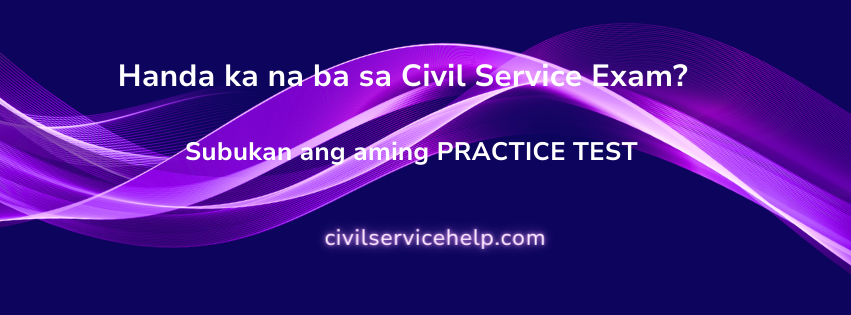Alamin kung paano ang tamang paggamit ng ADVERBS
Basahin ang mga Common Adverbs at mga halimbawa!

Adverbs - Civil Service Exam
Definition: What is an Adverb
An adverb is a part of speech that modifies verbs, adjectives, other adverbs, or entire sentences. Adverbs provide additional information about how, when, where, to what extent, or under what conditions something happens.
Types of Adverbs:
1. Adverbs of Manner: Describe how an action is performed.
Example: She sings beautifully. (“beautifully” modifies “sings”)
2. Adverbs of Time: Indicate when an action occurs.
Example: We will meet tomorrow. (“tomorrow” modifies “will meet”)
3. Adverbs of Place: Indicate where an action occurs.
Example: The children are playing outside. (“outside” modifies “are playing”)
4. Adverbs of Frequency: Indicate how often an action occurs.
Example: She always arrives early. (“always” modifies “arrives”)
5. Adverbs of Degree: Indicate the intensity or degree of an action, adjective, or another adverb.
Example: The test was extremely difficult. (“extremely” modifies “difficult”)
6. Adverbs of Reason: Explain why an action occurs.
Example: He therefore decided to leave early. (“therefore” modifies “decided”)
Forming Adverbs:
Most adverbs are formed by adding “-ly” to an adjective.
Example: Quick (adjective) → Quickly (adverb)
Position of Adverbs:
The position of adverbs can vary depending on what they are modifying.
Adverbs modifying verbs usually come after the verb.
Example: She ran quickly.
Adverbs modifying adjectives or other adverbs usually come before the word they modify.
Example: She is very talented. (modifying adjective “talented”)
Example: He runs quite slowly. (modifying adverb “slowly”)
Commonly Confused Adverbs and Adjectives:
Good (adjective) vs. Well (adverb)
Example: She is a good singer. (adjective modifying noun “singer”)
Example: She sings well. (adverb modifying verb “sings”)
Understanding adverbs and their usage helps in creating more precise and detailed sentences, thereby enhancing clarity and expressiveness in writing and speaking.
Common Adverbs
1. Carefully
• Usage: “Carefully” describes performing an action with attention, caution, and precision to avoid mistakes or accidents.
• Example: She carefully wrapped the fragile gift in tissue paper to ensure it wouldn’t break during transport.
2. Quickly
• Usage: “Quickly” means doing something in a fast or rapid manner, with speed and efficiency.
• Example: The chef chopped the vegetables quickly to save time while preparing dinner.
3. Cautiously
• Usage: “Cautiously” suggests being careful or wary, especially when proceeding in uncertain or risky situations.
• Example: The hiker cautiously navigated the rocky trail, mindful of loose stones and slippery surfaces.
4. Boldly
• Usage: “Boldly” signifies doing something with confidence, courage, or without fear of consequences.
• Example: She boldly confronted her fears and delivered a passionate speech in front of the audience.
5. Quietly
• Usage: “Quietly” describes doing something in a hushed or subdued manner, without making much noise.
• Example: The librarian walked quietly among the bookshelves, ensuring not to disturb the readers.
6. Patiently
• Usage: “Patiently” suggests waiting calmly and without complaint, especially in situations where delay or frustration is expected.
• Example: He patiently waited for his turn in line, knowing that rushing wouldn’t make the line move any faster.
7. Anxiously
• Usage: “Anxiously” describes feeling nervous, worried, or eagerly anticipating something.
• Example: She waited anxiously for the results of her exam, hoping that she had performed well.
8. Happily
• Usage: “Happily” signifies doing something with joy, contentment, or pleasure.
• Example: The children played happily in the park, laughing and chasing each other around.
9. Slowly
• Usage: “Slowly” means doing something at a leisurely or unhurried pace, without rushing.
• Example: He walked slowly through the garden, taking in the beauty of each flower and plant.
10. Suddenly
• Usage: “Suddenly” indicates that something happens quickly and unexpectedly, catching someone by surprise.
• Example: Suddenly, a loud noise startled the cat, causing it to jump up and run away.
11. Loudly
• Usage: “Loudly” describes doing something with a high volume or intensity, making a strong sound.
• Example: The band played loudly at the concert, filling the stadium with their energetic music.
12. Carelessly
• Usage: “Carelessly” means performing an action without paying attention or taking proper care, often resulting in mistakes or accidents.
• Example: He carelessly knocked over the glass of water, spilling it all over the table.
13. Reluctantly
• Usage: “Reluctantly” suggests doing something with hesitation or unwillingness, often due to not wanting to do it.
• Example: She reluctantly agreed to attend the party, even though she would have preferred to stay home.
14. Clearly
• Usage: “Clearly” signifies doing something in a way that is easy to understand, perceive, or see.
• Example: The teacher explained the concept clearly, using simple examples to illustrate her point.
15. Proudly
• Usage: “Proudly” describes doing something with a sense of satisfaction, accomplishment, or pride.
• Example: She proudly displayed her artwork on the wall, excited to share it with others.
16. Happily
• Usage: “Happily” means doing something with joy, contentment, or pleasure.
• Example: The children played happily in the park, laughing and chasing each other around.
17. Nervously
• Usage: “Nervously” suggests doing something with anxiety, fear, or apprehension.
• Example: He tapped his foot nervously as he waited for the interview to begin, worried about how it would go.
18. Quietly
• Usage: “Quietly” describes doing something in a hushed or subdued manner, without making much noise.
• Example: The librarian walked quietly among the bookshelves, ensuring not to disturb the readers.
19. Proudly
• Usage: “Proudly” describes doing something with a sense of satisfaction, accomplishment, or pride.
• Example: She proudly displayed her artwork on the wall, excited to share it with others.
20. Happily
• Usage: “Happily” means doing something with joy, contentment, or pleasure.
• Example: The children played happily in the park, laughing and chasing each other around.
Practice Test on Use of Adverbs - Civil Service Exam
1.In the sentence, “She ________ wrapped the fragile gift in tissue paper to ensure it wouldn’t break during transport,” which adverb best fits the blank?
A) Carelessly
B) Boldly
C) Carefully
D) Reluctantly
Correct Answer: C) Carefully
Explanation: “Carefully” means performing an action with attention and precision to avoid mistakes or accidents.
2. In the sentence, “The chef chopped the vegetables ________ to save time while preparing dinner,” which adverb best fits the blank?
A) Slowly
B) Quickly
C) Loudly
D) Patiently
Correct Answer: B) Quickly
Explanation: “Quickly” means doing something in a fast or rapid manner.
3. In the sentence, “The hiker ________ navigated the rocky trail, mindful of loose stones and slippery surfaces,” which adverb best fits the blank?
A) Happily
B) Anxiously
C) Cautiously
D) Proudly
Correct Answer: C) Cautiously
Explanation: “Cautiously” suggests being careful or wary in uncertain or risky situations.
4. In the sentence, “She ________ confronted her fears and delivered a passionate speech in front of the audience,” which adverb best fits the blank?
A) Reluctantly
B) Boldly
C) Quietly
D) Nervously
Correct Answer: B) Boldly
Explanation: “Boldly” signifies doing something with confidence and courage.
5. In the sentence, “The librarian walked ________ among the bookshelves, ensuring not to disturb the readers,” which adverb best fits the blank?
A) Quickly
B) Loudly
C) Quietly
D) Clearly
Correct Answer: C) Quietly
Explanation: “Quietly” describes doing something in a hushed manner without making much noise.
6. In the sentence, “He ________ waited for his turn in line, knowing that rushing wouldn’t make the line move any faster,” which adverb best fits the blank?
A) Happily
B) Patiently
C) Anxiously
D) Suddenly
Correct Answer: B) Patiently
Explanation: “Patiently” means waiting calmly and without complaint.
7. In the sentence, “She waited ________ for the results of her exam, hoping that she had performed well,” which adverb best fits the blank?
A) Nervously
B) Cautiously
C) Proudly
D) Anxiously
Correct Answer: D) Anxiously
Explanation: “Anxiously” describes feeling nervous or eagerly anticipating something.
8. In the sentence, “The children played ________ in the park, laughing and chasing each other around,” which adverb best fits the blank?
A) Quietly
B) Happily
C) Boldly
D) Reluctantly
Correct Answer: B) Happily
Explanation: “Happily” signifies doing something with joy and pleasure.
9. In the sentence, “He walked ________ through the garden, taking in the beauty of each flower and plant,” which adverb best fits the blank?
A) Slowly
B) Quickly
C) Boldly
D) Anxiously
Correct Answer: A) Slowly
Explanation: “Slowly” means doing something at a leisurely or unhurried pace.
10. In the sentence, “________, a loud noise startled the cat, causing it to jump up and run away,” which adverb best fits the blank?
A) Suddenly
B) Reluctantly
C) Patiently
D) Loudly
Correct Answer: A) Suddenly
Explanation: “Suddenly” indicates that something happens quickly and unexpectedly.
11. In the sentence, “The band played ________ at the concert, filling the stadium with their energetic music,” which adverb best fits the blank?
A) Quietly
B) Slowly
C) Loudly
D) Carefully
Correct Answer: C) Loudly
Explanation: “Loudly” describes doing something with high volume or intensity.
12. In the sentence, “He ________ knocked over the glass of water, spilling it all over the table,” which adverb best fits the blank?
A) Carefully
B) Quickly
C) Carelessly
D) Boldly
Correct Answer: C) Carelessly
Explanation: “Carelessly” means performing an action without attention, often leading to mistakes.
13. In the sentence, “She ________ agreed to attend the party, even though she would have preferred to stay home,” which adverb best fits the blank?
A) Happily
B) Boldly
C) Reluctantly
D) Patiently
Correct Answer: C) Reluctantly
Explanation: “Reluctantly” suggests doing something with hesitation or unwillingness.
14. In the sentence, “The teacher explained the concept ________, using simple examples to illustrate her point,” which adverb best fits the blank?
A) Clearly
B) Loudly
C) Slowly
D) Happily
Correct Answer: A) Clearly
Explanation: “Clearly” means doing something in an easy-to-understand manner.
15. In the sentence, “She ________ displayed her artwork on the wall, excited to share it with others,” which adverb best fits the blank?
A) Patiently
B) Reluctantly
C) Proudly
D) Anxiously
Correct Answer: C) Proudly
Explanation: “Proudly” describes doing something with a sense of satisfaction or pride.
16. In the sentence, “The children played ________ in the park, laughing and chasing each other around,” which adverb best fits the blank?
A) Happily
B) Boldly
C) Slowly
D) Anxiously
Correct Answer: A) Happily
Explanation: “Happily” means doing something with joy and pleasure.
17. In the sentence, “He tapped his foot ________ as he waited for the interview to begin, worried about how it would go,” which adverb best fits the blank?
A) Proudly
B) Quickly
C) Nervously
D) Reluctantly
Correct Answer: C) Nervously
Explanation: “Nervously” suggests doing something with anxiety, fear, or apprehension.
18. In the sentence, “The librarian walked ________ among the bookshelves, ensuring not to disturb the readers,” which adverb best fits the blank?
A) Quietly
B) Loudly
C) Boldly
D) Happily
Correct Answer: A) Quietly
Explanation: “Quietly” describes doing something in a hushed manner without making much noise.
19. In the sentence, “She ________ displayed her artwork on the wall, excited to share it with others,” which adverb best fits the blank?
A) Nervously
B) Proudly
C) Reluctantly
D) Patiently
Correct Answer: B) Proudly
Explanation: “Proudly” describes doing something with a sense of satisfaction or pride.
20. In the sentence, “The children played ________ in the park, laughing and chasing each other around,” which adverb best fits the blank?
A) Happily
B) Boldly
C) Slowly
D) Anxiously
Correct Answer: A) Happily
Explanation: “Happily” means doing something with joy and pleasure.


